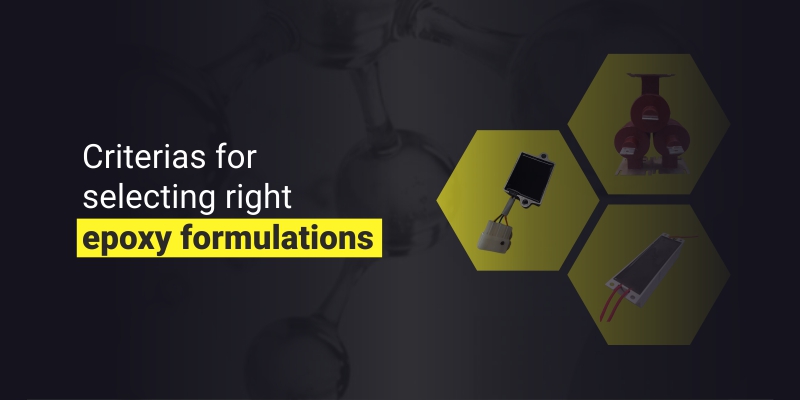Selecting the right Epoxy Formulations is at times very tricky and challenging, getting right molecular combination for your specific requirement is important. When selecting an industrial epoxy, there are several criteria to consider to ensure the best performance and suitability for your specific application. Here are some key factors to keep in mind:
- Chemical Resistance: Determine the types of chemicals or substances the epoxy will come into contact with. Consider the potential for corrosion, degradation, or chemical attack, and choose an epoxy that offers resistance to those specific substances.
- Temperature Resistance: Evaluate the temperature range the epoxy will be exposed to. Some epoxies are formulated to withstand high temperatures, while others may lose their properties or degrade under extreme heat. Select an epoxy that can handle the anticipated temperature conditions.
- Bond Strength and Adhesion: Consider the surface or substrates that need to be bonded. Different epoxies have varying adhesion properties to different materials. Ensure the epoxy provides strong bonding characteristics to the specific surfaces you are working with.
- Cure Time and Handling Strength: Evaluate the curing time of the epoxy. Some applications may require fast curing epoxies for quicker turnaround times, while others may benefit from longer curing times for improved bond strength. Additionally, consider the handling strength of the epoxy, as it should be able to support the required loads within a reasonable time frame.
- Flexibility and Impact Resistance: Assess the flexibility and impact resistance requirements of your application. Epoxies with higher flexibility are better suited for environments where movement, vibration, or impacts are expected.
- UV Stability: If the epoxy will be exposed to sunlight or outdoor conditions, UV stability is crucial to prevent yellowing, degradation, or loss of mechanical properties. Look for epoxies with UV-resistant formulations.
- Pot Life and Mixing Ratio: Consider the pot life (working time) of the epoxy, which determines how long it remains in a workable state after mixing. Some epoxies have a longer pot life, allowing more time for application. Additionally, check the mixing ratio required for proper curing, as accurate mixing is essential for achieving desired results.
- Application Method: Consider the application method you will use, whether it’s brushing, spraying, or pouring. Some epoxies are specifically formulated for certain application techniques, so ensure the epoxy you select is compatible with your chosen method.
- Safety and Environmental Considerations: Evaluate the safety precautions and environmental impact associated with the epoxy. Check if the epoxy is solvent-free or low in volatile organic compounds (VOCs) to minimize health risks and environmental harm.
- Cost: Finally, consider the overall cost of the epoxy, including the product itself and any associated application or maintenance expenses. While cost is an important factor, it should not be the sole determining factor. Prioritize performance and suitability for your application first.
Keep in mind that different industrial epoxy manufacturers may have specific product lines tailored to various applications. It’s always recommended to consult with epoxy suppliers or manufacturers to ensure you select the most suitable epoxy for your specific needs.

